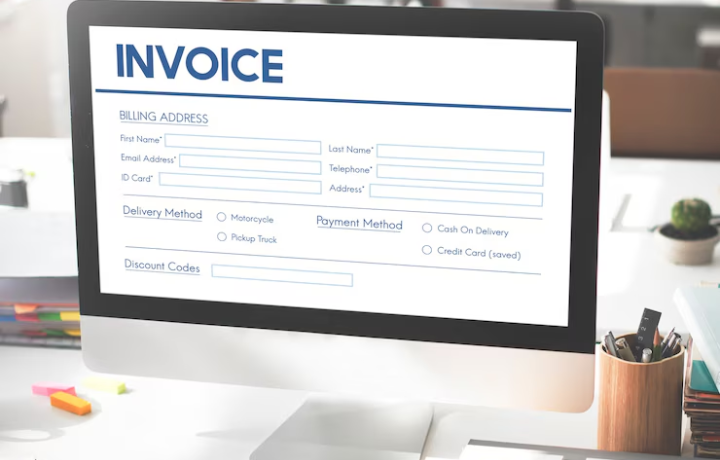
-
Apexlink
Real Estate
-
DLS
General Insurance
-
DMV
Government
-
Entiger
Fintech
-
GIS Mapping
Gas & Petroleum
-
HMS
Employee Benefit
-
HAWA
Government
-
Harley
Community
-
IHG
Hotel & Tourism
-
Sparkseeker
Humane Tech
-
Track Ninja
Sports
-
Response Vision
Disaster Management
- AI/ML Services
- Application Services
- Automation Services
- Cyber Security
- Chatbot Experts
- Data Analysis
- Data Warehouse Services
- Digital Commerce Services
- Digital Transformation
- Infrastructure Service
- Low Code/No Code
- Managed IT Services
- IT Support
- IT Consulting
- IT Outsourcing
- Mobile App Development
- IOS Development
- Android Development
- Cross Platform Development
- Gaming App Development
- Software Development
- System Design & Architecture
- Testing Services
- Web Development
Accelerators
POCs and Products
Did you know that incorrect invoices cost firms 5–10% of their yearly revenue? This startling figure highlights just how important a dependable billing system is. The margin of error is shrinking in the current dynamic marketplace, and finance teams need to be quicker and more efficient than ever. In addition to being sluggish and prone to errors, outdated invoicing practices also make building long-lasting connections with your clients almost impossible.

All of these inefficiencies can be effectively addressed with automated billing software, often known as billing automation software. Billing software that blends with your current processes can greatly increase accuracy and speed up payments, all while lowering overhead costs, regardless of how big your company is.
The State of Billing Today
Customers of today need prompt, accurate bills along with easy ways to pay. While smooth, open billing encourages enduring loyalty, inaccurate or delayed invoices can erode trust.
Additionally, protecting transaction and customer data is given more importance by legal frameworks like GDPR and PCI-DSS. Serious fines and harm to one's reputation may result from any noncompliance. To overcome these issues, fintech software solutions—particularly those from a respectable fintech software development company—incorporate several security levels.
To add to that, digital wallets, UPI, cryptocurrency, and other new payment methods are now mainstream in many industries. Integrating these into your billing solution ensures that your business can cater to a broader audience and streamline payment collection.
The current billing landscape also addresses the common pain points of manual billing, such as:
- Relying on manual processes often results in late or inaccurate invoices, which can erode customer satisfaction and extend your accounts receivable periods.
- A lot of manpower is wasted in tasks that can be automated—creating invoices, sending payment reminders, and tracking overdue bills.
- Without an integrated CRM software or billing dashboard, it’s difficult to gain real-time insights into cash flow, pending invoices, and payment cycles.
- Managing multiple payment gateways manually can be cumbersome. Errors or mismatched data across platforms can lead to severe reconciliation issues.

Key Features of an Effective Automated Billing System
Real-Time Invoice Generation
A robust automated billing software solution automatically generates invoices with accurate calculations and professional templates. This eliminates duplicate entries and reduces manual intervention, ensuring invoices go out instantly.
Flexible Payment Gateway Integration
Offer your customers their preferred payment methods by integrating multiple gateways—credit cards, online wallets, bank transfers, and more. Payment gateway integration widens your audience and streamlines payment collection.
Smart Analytics & Reporting
Built-in analytics tools provide actionable insights into revenue patterns, late payments, and customer behaviors. This data can guide strategic decisions around pricing and product offerings.
Automated Reminders & Notifications
Set up automated reminders to notify customers of due dates. This proactivity helps you collect payments faster, improve cash flow, and reduce the likelihood of bad debt.
Multi-Currency & Tax Handling
For businesses operating in different regions, the software should automatically manage varied tax rates, currencies, and compliance requirements. This capability removes significant administrative hassles.
CRM Software Integration
By integrating CRM software into your billing solution, you can maintain a single source of truth for all customer data—contacts, purchase history, payment status—and facilitate better coordination between your sales and finance teams.
Scalability & Customization
A billing automation software platform must be modular and easy to scale. Whether you’re adding new product lines, expanding into new regions, or catering to different pricing models, your system should adapt without expensive overhauls.
Tech Trends Shaping Billing Software Development in 2024
1. AI & Machine Learning
Automated billing powered by AI can flag irregularities, predict payment delays, and learn from historical data to recommend optimal payment terms.
2. Cloud Deployments
Cloud-based software development services offer on-demand scalability, robust security protocols, and lower IT maintenance costs. This approach also ensures near-zero downtime and easy updates.
3. Advanced Encryption & Blockchain
Cutting-edge fintech software development solutions are using blockchain for tamper-proof ledgers and end-to-end transaction traceability, which drastically reduces fraud risks.
4. API-Centric Integrations
Businesses increasingly demand an ecosystem of integrated solutions—CRM software development, payment software development, ERPs, and more. API-driven connectivity ensures your automated billing software meshes seamlessly with other mission-critical applications.

Best Practices for Billing Automation
Start Small, Then Scale
Focus on automating your most time-consuming tasks first. Once you see ROI, scale up to handle more complex processes.
Leverage Data Analytics
Data doesn’t lie. Track metrics like DSO (Days Sales Outstanding), dispute resolution time, and customer satisfaction to refine your approach.
Prioritize Security
Finances are sensitive. Ensure your billing software meets global compliance standards (PCI-DSS, GDPR). This fosters trust and avoids legal pitfalls.
Offer Multiple Payment Options
Modern customers have diverse payment preferences. Incorporate credit/debit cards, net banking, e-wallets, BNPL (Buy Now, Pay Later), and more.
Automate Notification & Escalation
Don’t wait until an invoice is months overdue. Automated follow-ups help maintain healthy cash flow.
Measuring the ROI of Automated Billing Software
Faster Payments
Shorter billing cycles directly correlate with improved cash flow, enabling your business to reinvest funds more quickly.
Reduced Operational Costs
Automation drastically cuts down on labor-intensive tasks like invoice entry, data checks, and follow-ups, freeing your team for more strategic work.
Error Elimination
Manual processes are prone to human error, which can be costly in both time and reputation. Automated billing ensures precise calculations and records.
Customer Loyalty
Easy, transparent, and fast billing processes elevate customer satisfaction, leading to higher retention and potential referrals.
Scalability
As your volume grows, your automated system simply scales with it – no major rebuilds, or re-training required.
Why Choose Seasia Infotech for Your Automated Billing Needs?
Expertise in Fintech Software Development
As a leading fintech software development company, we stay updated with the latest regulatory changes, payment technologies, and security protocols to ensure your billing system remains robust and future-proof.
End-to-End Software Solutions
From billing software development to CRM software, payment gateway integration, and more, we provide software development services that work cohesively, streamlining every aspect of your business operations.
Custom-Tailored Approach
We understand that no two businesses are alike. Our automated billing software development process aligns with your unique requirements, ensuring solutions are flexible, scalable, and easy to maintain.
Proven Track Record
Our solutions have helped clients across various industries—SaaS, retail, logistics, healthcare—achieve faster invoicing, minimize errors, and boost overall revenue.
Dedicated Post-Implementation Support
We don’t just build and deploy; we stay with you for ongoing support, updates, and improvements. This commitment ensures your system stays relevant and secure over the long term.

Take Action: Elevate Your Billing Process Now
Ready to take your billing process to the next level? Request a consultation where our experts evaluate your current billing workflow, identify potential inefficiencies, and recommend a tailor-made roadmap.
With Seasia Infotech by your side, you can benefit from the top software development company capabilities, including end-to-end software solutions that improve your billing processes' speed, accuracy, and transparency. Instead of letting obsolete processes drag you down, take a proactive stance and see the revenues soar.
Final Thoughts
Adopting cutting-edge solutions that remove manual errors, lower operating costs, and enhance the customer experience is essential to staying competitive in a world that prioritizes digitalization. One notable strategic investment that improves your financial workflows and helps you achieve a healthier bottom line is automated billing software. By working with Seasia Infotech, you're selecting a leader in the fields of payment, CRM, and billing software development that has a track record of advancing other industry leaders!
Transform your billing operations today. Get in touch with Seasia Infotech and experience hassle-free, automated invoicing that keeps your customers happy and your revenue streams healthier than ever.
Frequently Asked Questions
What is automated billing software?
Automated billing software streamlines and automates the process of generating invoices, collecting payments, and managing financial data to reduce errors and speed up cash flow.
Which language is used to make billing software?
Billing software can be developed in various languages (like Java, C#, Python, or PHP), depending on the project's requirements and the developer's expertise.
Which software is used in billing systems?
Billing systems often rely on specialized platforms like ERP modules (e.g., SAP, Oracle), custom-built solutions, or cloud-based services (e.g., QuickBooks, Zoho) tailored for invoicing and payment processing.
What types of businesses use automated billing software?
Businesses of all sizes and sectors, including SaaS, e-commerce, healthcare, and logistics, use automated billing software to manage invoicing, payments, and financial reporting.







 Blockchain
Blockchain Cloud Computing
Cloud Computing Infrastructure
Services
Infrastructure
Services Metaverse
Metaverse QA
Automation
QA
Automation UI/UX
UI/UX







